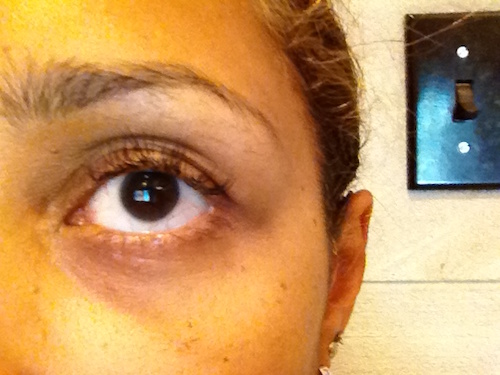My daughter is messy. Very messy. It never crosses her mind to pick up the clothes she flings on the floor, to put away her plate or cup, or to clean off her desk so there’s actually a usable surface. We live in a small space so everything is amplified, and minor messes become unmanageable very quickly.
For the past 5 days there has been a hot pink bra lying in the middle of my cream-colored living room. Each of the 100 times I walk by it, I wonder how it is she does not see it. It is the brightest thing in the whole house. I’m tired of asking, begging, pleading, threatening and otherwise expending energy on it. I want the owner to pick it up, without one more word from me.
As a child, I was infinitely worse than my daughter. I don’t believe anyone saw the carpet in my room during the 10 years I lived in my last childhood house. My parents also gave up… on many things, actually. I would get an occasional request to clean up, which I could easily ignore. Even my friends’ taunts weren’t enough to change my behavior.
When I was a teenager, our house was broken into and ransacked. We stood, shaken and traumatized as the police checked around the house. The first floor was an absolute disaster. When they returned from upstairs, they indicated it had not been as badly damaged, except for one room, which appeared to be the hardest hit. We all ran up to check our bedrooms, as the officer pointed to the right. Yes, it was my room. and it was completely unchanged from how I left it.
The joke, when we were able to joke about the whole thing, was that each of the burglars must have thought the other one had gotten there first. I tried not to be indelicate about the situation, but certainly thought the thought that there were benefits to being a slob.
It’s slightly difficult to put myself back into that teenage mindset, but I do remember not understanding what the big deal was. I wasn’t sharing the room with anyone, could almost always find what I needed and didn’t have a hygiene problem. It was just disorganized, but to me it worked just fine. I know it was not how my parents wanted their house to look, but no one had to see it.
In fact, I couldn’t even see it. I couldn’t see how much energy I was using trying to sustain that degree of mess. Constantly looking for things buried under piles. The scene became ‘normal’, like a background you no longer notice.
I know my daughter does not see her mess. She will literally stand in a room littered with her clothes and look up at me, questioning what exactly I wanted her to pick up. Not until I point out the individual items, or sometimes an entire section, does she realize. I think about how something so visible, so pointed and blaring, could be overlooked.
Of course, this is how it always happens, isn’t it? A group of people each have a different telling of the scene they just saw. I see the forest and you see the trees. The difference, I believe, is the pair of lenses we are looking through and the meaning-making machine that runs the translation. I know that pink bra is not hurting anyone. Heck, it might even be decorative. but it represents defiance, which translates into an indictment of my parenting skills. And my ability to take care of my house. And my ability to take care of myself. It is a slap in the face of responsible adulthood.
Every time I walk by the offensive bra, it becomes brighter, bigger, and more inflammatory. Every time my daughter walks by it, it grows more undetectable. Invisible-er, as it were.
I wonder how much of our lives are run this way. Where the thing that glares the brightest in your universe is invisible to the others around you. Where your mess means nothing, but their mess means everything. How powerful would it be to use another set of eyes, and see the world that way? How liberating would it be to not ascribe motive and meaning to other’s actions?
I don’t have to choose to see my daughter’s actions as defiance. I can just ask her to pick up her bra. Simple enough, right?
What shift has to happen in what YOU see? Tell me below.
Like this article? Get your own personal slice of my brain delivered straight to your inbox by signing up here. Make sure to tell your friends, too. The more, the merrier.

2 responses to “What We See: A Practice in Choosing”
[…] Hi there! If you’d like to read this blog post over at my lovely new website, click here. My daughter is messy. Very messy. It never crosses her mind to pick up the clothes […]
[…] is life changing. It’s in my core beliefs here, and I write about it here and here. That lesson is perhaps one of the most consistent aspects of my […]